sidewalklabs
Latest
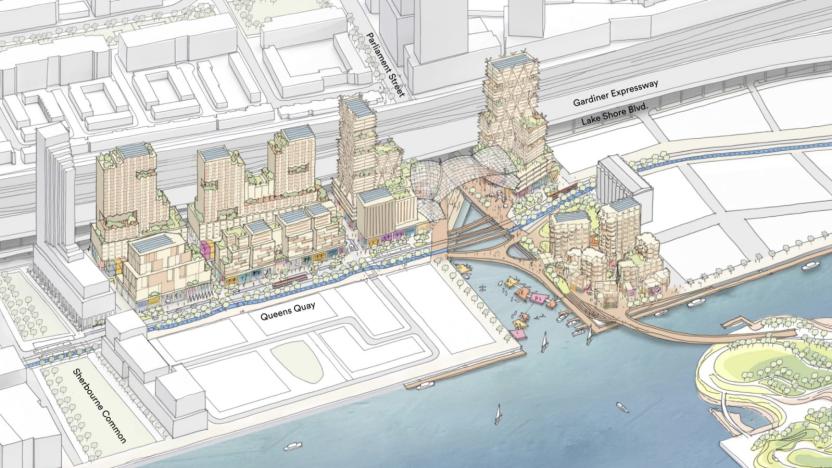
Sidewalk Labs reveals site plan for smart neighborhood in Toronto
Sidewalk Labs' smart neighborhood in Toronto is edging closer to becoming a reality after it revealed the initial draft plan for the site. It's proposing that Quayside should be focused around 12 mass-timber buildings, with a maximum height of 30 stories and a mix of residential, retail and commercial spaces in each.

Google’s smart city dream is turning into a privacy nightmare
Sidewalk Labs, an Alphabet division focused on smart cities, is caught in a battle over information privacy. The team has lost its lead expert and consultant, Ann Cavoukian, over a proposed data trust that would approve and manage the collection of information inside Quayside, a conceptual smart neighborhood in Toronto. Cavoukian, the former information and privacy commissioner for Ontario, disagrees with the current plan because it would give the trust power to approve data collection that isn't anonymized or "de-identified" at the source. "I had a really hard time with that," she told Engadget. "I just couldn't... I couldn't live with that."
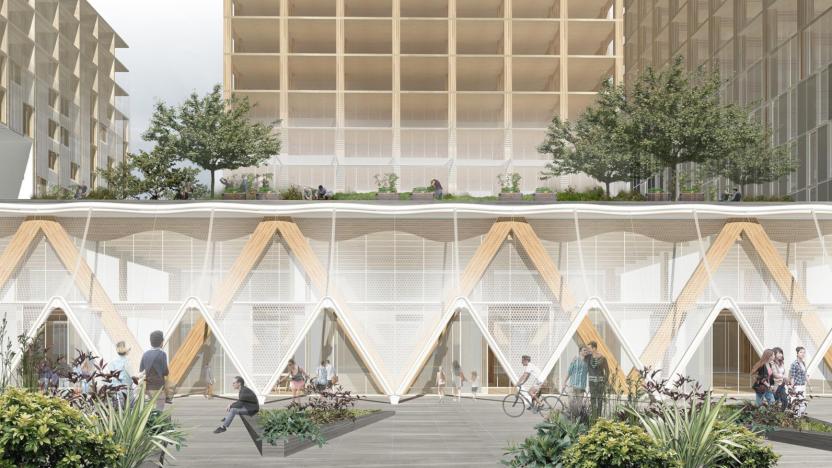
Sidewalk Labs unpacks its Quayside smart city dream
Sidewalk Labs still has a ways to go before it realizes its futuristic vision for Toronto's Eastern Waterfront, but we now know what the smart neighborhood could look like. The Alphabet-owned company has released (PDF) mock-ups and illustrations for the "Quayside," along with details that elaborate on its plans to build the community with lots and lots of wood. Sidewalk Labs plans to use tall timber construction, a method that uses engineered wood, for the buildings in the area.
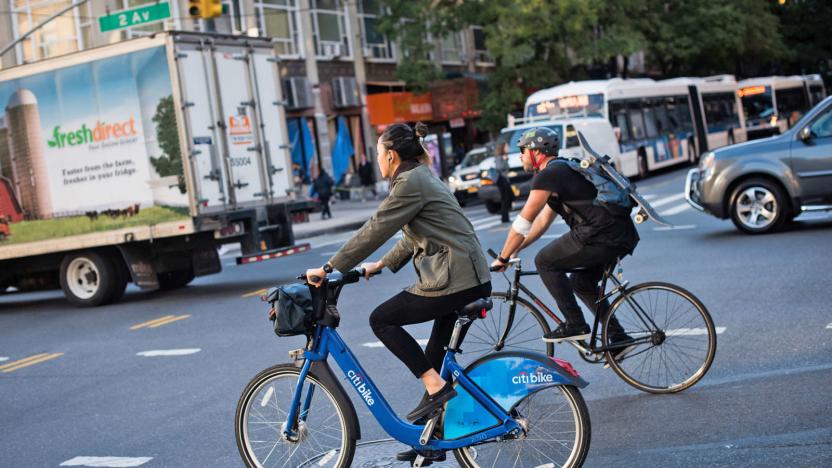
Google’s Sidewalk Labs made the ultimate public transport guide
Google's parent company, Alphabet, has an offshoot called Sidewalk Labs tasked with improving urban living. The division gave birth to Coord, a spin-off which is launching a smart route planner today for people in New York City and Washington DC. The web app supports multiple modes of transportation -- bus, subway and bike rentals -- and will recommend different combinations based on live, street-level data. It's a unique blend -- other navigation apps don't include dockless bike sharing services such as Spin and Jump. That means you can quickly locate the nearest two-wheeler and judge whether it would be quicker to take the bus or tube.
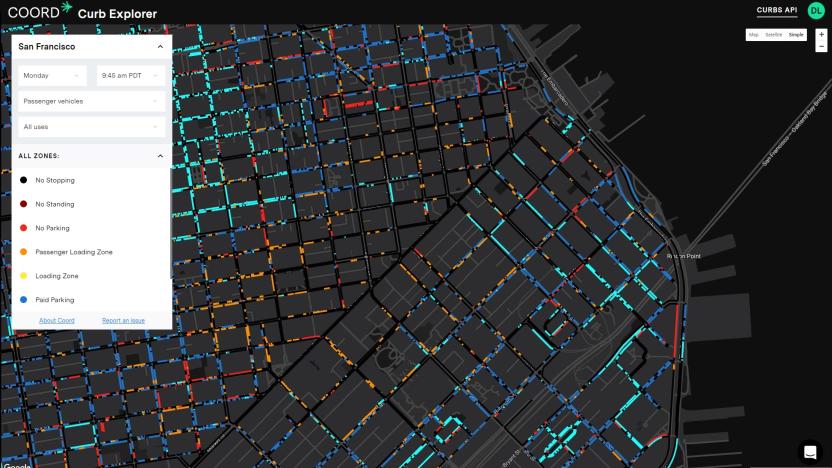
Google's Sidewalk Labs made a map of every good parking spot in SF
Last month, Alphabet's city-innovating department Sidewalk Labs introduced Coord, a new cloud-based company that provides data on all the curbs in a city, among other information. In practice, businesses can use this to figure out in real-time where to load and unload goods, pick up passengers and park. But to visualize the benefits of chartering its service, Coord has created a free tool that maps all the curbs in San Francisco, which anyone can use to figure out the city's parking and loading situation.
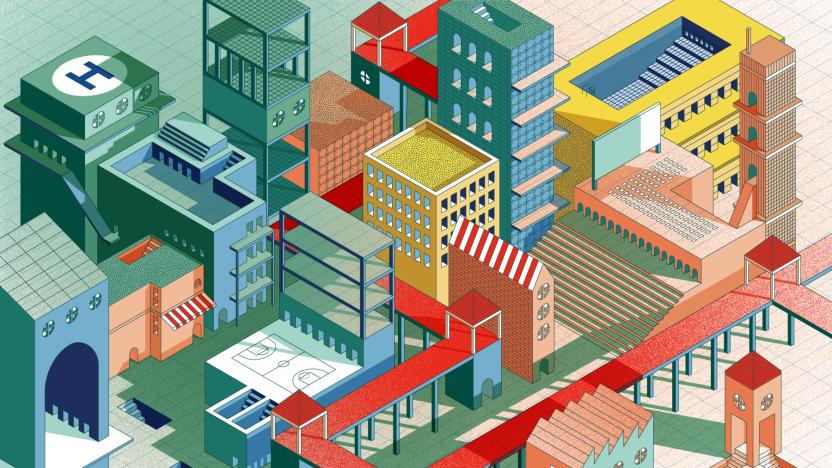
Inside Google’s plan to build a smart neighborhood in Toronto
On the Sidewalk Labs website is a 200-page document explaining its vision for a smart neighborhood in Toronto. It's packed with illustrations that show a warm, idyllic community full of grassy parks, modular buildings and underground tunnels with delivery robots and internet cabling inside. The text describes "a truly complete community" that's free of cars and committed to reducing its carbon footprint. Underpinning everything is a network of sensors that can monitor noise, traffic and pollution, collecting the troves of data required to understand and improve the city's design. Flipping through the pages, it's easy to see how the company -- an offshoot of Google parent Alphabet -- was chosen to revitalize the Lake Ontario waterfront. The lengthy pitch document, however, is just a taste of what the area might become. It's a dreamy but meticulously thought-out mood board summarizing what Sidewalk Labs has been pondering for the past two years. Reading it cover to cover, you can get lost in the scale and ambition of such a project. Most companies would struggle to execute just one aspect of the plan: autonomous transit, for instance, or buildings that can be quickly and cheaply repurposed depending on the time of day or needs of the city. Sidewalk Labs, however, wants to do it all.
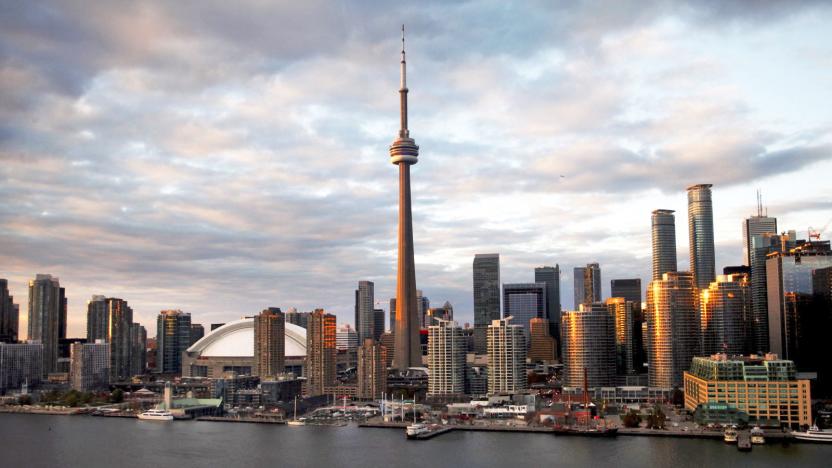
Alphabet’s Sidewalk Labs is building an 'internet city' in Toronto
The next step for Alphabet's Sidewalk Labs is making a 2,000 acre smart neighborhood in Toronto. Google Canada will relocate its headquarters to the newly created Quayside neighborhood along the Eastern Waterfront to serve as an anchor for the area, and will invest some $50 million in the first phase of planning and project testing, according to a press release. The entire project could cost as much as $1 billion, Wall Street Journal reports. TechCrunch writes that an additional $1.25 billion will come from Toronto itself. Prime minister Justin Trudeau said that the move is to make for "smarter, greener, more inclusive" cities that he hopes will expand across Toronto and eventually the globe.
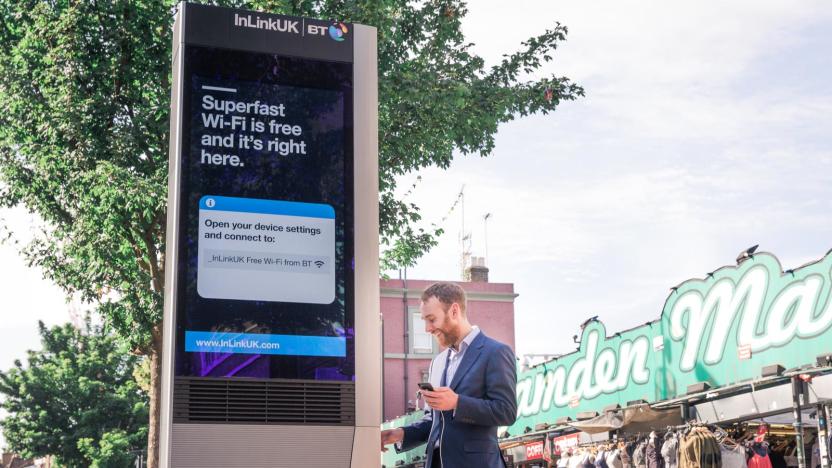
London is the second city to get free gigabit WiFi kiosks
London's countless telephone boxes become more redundant with every new mobile contract signed and throwaway tourist SIM purchased. Having a mind to update these payphones for the modern age, BT -- which owns the majority of them -- announced last year it had teamed up with the same crew behind New York's LinkNYC free gigabit WiFi kiosks to make that happen. The first of these, installed along London's Camden High Street, have been switched on today, offering the fastest public WiFi around, free phone calls, USB charging, maps, directions and other local info like weather forecasts, Tube service updates and community messages.
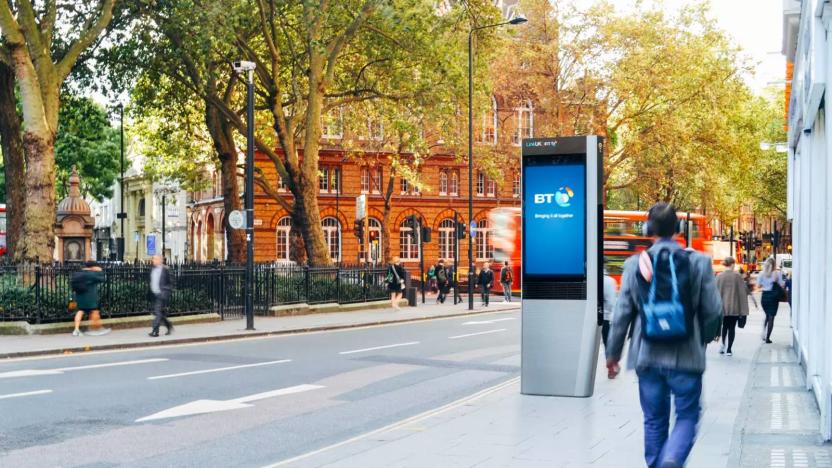
New York's free gigabit WiFi kiosks are coming to the UK
BT celebrated the 80th birthday of London's iconic red phone boxes earlier this month, and while some of these are being updated for the digital age, there are still countless antiquated payphones across the country needing a new lease of life. Today, BT has announced plans to rip out hundreds of these and replace them with next-gen kiosks that'll offer free gigabit WiFi, free UK calls, charging facilities and access to maps, directions and info on local services via an embedded Android tablet.

Sidewalk Labs' smart city kiosks go way beyond free WiFi
The details of an ambitious plan from Google's sister company Sidewalk Labs to create entire "smart neighborhoods" just got a little clearer. According to Sidewalk Labs' pitch deck, which was obtained by Recode this week, the plan goes far beyond those free WiFi kiosks that are already on the streets of New York City. The kiosks will monitor everything from bike and pedestrian traffic to air quality and street noise.

Alphabet proposes scrapping buses in favor of Ubers (updated)
Sidewalk Labs, Alphabet's smart cities think-tank, wants governments to scrap buses and other forms of public transport. That's the headline stat coming out of a cache of documents obtained by the Guardian that reveals the firm's plans for the city of Columbus, Ohio. The 15th largest city in the US recently won a Smart City challenge, complete with $50 million in extra funding from the Department of Transportation. One of the pillars of the proposals is to do away with the remnants of vital public services and scrapping subsidized travel for low-income workers. Instead, these people would be given discounted travel on certain ride-sharing services like Uber.
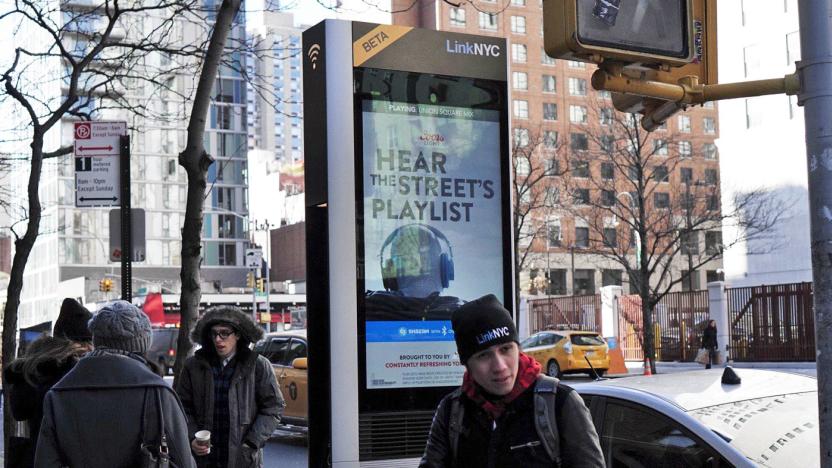
Google sister company wants to build smart city districts
Forget just providing internet access on city streets -- Google's sister firm Sidewalk Labs wants to create whole smart neighborhoods. Wall Street Journal sources hear that Sidewalk is about to propose to Alphabet that it should design whole city districts with technology in mind. It wants to revamp existing areas (likely in declining cities) with everything from higher-tech electrical grids to self-driving cars. It's even hoping to get city regulation waivers so that it can experiment with elements as basic as street design.
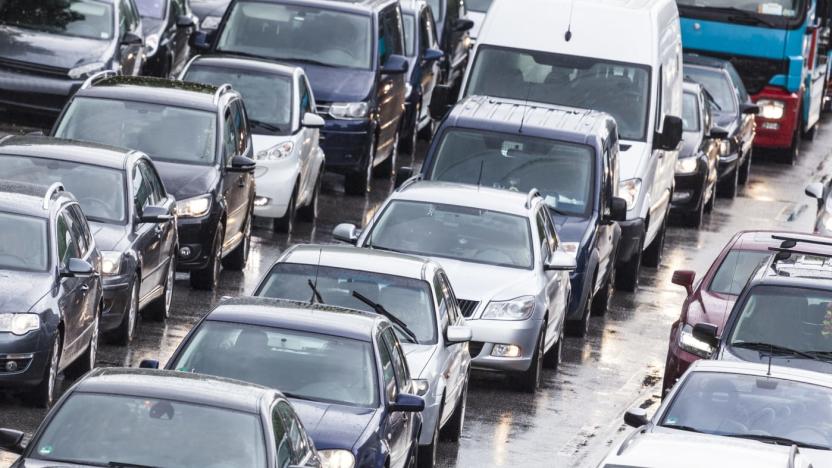
DoT and Alphabet plan to battle gridlock
Department of Transportation secretary Anthony Foxx and Alphabet's Sidewalk Labs announced a transportation platform today called Flow. The system will grab data from in-the-street sensors, WiFi-enabled Kiosks and anonymized information from Google-owned apps Maps and Waze to help inform cities about traffic. It will be rolled out to the winner of the Smart City Challenge for no cost.

Google's urban tech lab is working on free, city-wide WiFi
When Google unveiled its urban improvement initiative, Sidewalk Labs, it left one big question: what was this new outfit actually working on? As of today, you should have a good idea. Sidewalk and a group of investors have bought and merged two key companies behind LinkNYC, an effort to offer free, public WiFi across New York City. The combined entity, Intersection, will extended LinkNYC's internet-for-all technology to cities worldwide. Ideally, you'll one day "walk down any street" and expect to get fast wireless data. That sounds more than a little ambitious, but it makes sense given Google's sheer clout and desire for a ubiquitous internet. The easier it is for you to hop online, the easier it is for Google to serve up its money-making ads.

Google's plan to fix big cities starts with Sidewalk Labs
Google wants to do more than just simplify privacy for its users and put autonomous cars on the road, it wants to "improve city life for everyone." Cofounder Larry Page writes on G+ that with Mountain View's Sidewalk Labs, the company intends to do just that. The plan is to tackle cost of living, transportation efficiency and energy usage by creating and fostering what he calls urban technologies -- stuff Sidewalk says is a bit harder than just relaying traffic conditions or apartment prices. He likens the size of Sidewalk to that of the X lab responsible for Project Loon in terms of investment.








